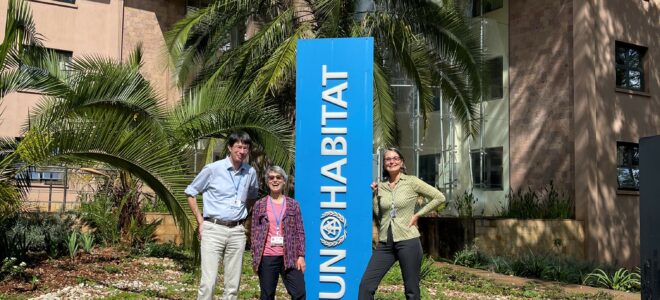The second session of the ad hoc Open-Ended Working Group (OEWG-2) on the Science-Policy Panel on Chemicals, Waste and Pollution Prevention is taking place in Nairobi, Kenya, from December 11 to December 15, 2023. Three IPCP Board Members are in attendance and are providing their daily summaries.
Before the actual OEWG-2 session starts tomorrow, this second day of preparatory meetings was, on the one hand, used for meetings of the UN regional groups, and on the other hand, for a meeting of the Major Groups under UNEP. The regional meetings are for the UN member states of each of the UN regions to exchange their views and coordinate their strategies for the OEWG discussions and negotiations. Often, these regional meetings are not open to other participants. Every day of the OEWG-2 meeting will have a one-hour meeting of each regional groups in the morning.
The Major Groups (MGs) are a structure that has been established to facilitate interaction of UNEP with a wide range of societal groups and stakeholders. The Civil Society Unit of UNEP organizes the interaction of UNEP with the MGs and other stakeholders. There are nine Major Groups, including Non-Governmental Organizations, Children and Youth, Farmers, Women, Indigenous Peoples and Local Communities, Science and Technology, Business and Industry, Local Authorities, and Workers and Trade Unions.
The IPCP delegation attended the MGs meeting and associated itself with the Science and Technology MG. The meeting was opened with words of welcome and introductions by Gudi Alkemade, Chair of the OEWG, Mohamed Abdelraouf and Camilla Alexander-White, Co-Chairs of the Major Groups Facilitating Committee, and Tessa Goverse, Principal Coordinator of the OEWG Secretariat.
In a first block of contributions, Tessa Goverse summarized where the process of setting up the new science-policy panel currently stands, after the OEWG-1.2 meeting in Bangkok and the intersessional work since then. She explained the various meeting documents that have been prepared by the Secretariat as a basis for OEWG-2 and that are all available from the OEWG-2 website. The next presentation was given by the IPCP Chair, Martin Scheringer, who had been invited to present the IPCP’s perspective on the issue of Conflicts of Interest. He summarized the IPCP’s extensive work of the COI topic, including the publication by Schäffer et al. on “Conflicts of Interest in the Assessment of Chemicals, Waste, and Pollution” (https://doi.org/10.1021/acs.est.3c04213) and pointed out that it is important, also in the work of the new panel, to recognize the difference between financial and non-financial interests and how often financial interests lead to conflicts of interest.
The following presentations covered, among others, the science-policy interface (SPI) on plastic pollution that is to be developed as a subsidiary body under the new plastics treaty and the relationship and division of work between this SPI and the new SPP (Lars Stordal, GRID-Arendal), the issue of highly hazardous pesticides (Ajay Kumar, Farmers’ MG), and thoughts on criteria for priority setting for the new SPP (Jill Hanna, Global Alliance on Health and Pollution).
In the afternoon, the meeting participants formed small discussion groups for all MGs represented at the meeting and discussed in a first round what kind of contributions to the work of the new panel each MG will be able to make and in what form and set-up their interaction with the new panel should take place. The Science and Technology MG said that they would like to be able to nominate experts to sit on the Interdisciplinary Expert Panel of the SPP, that each of the nine MGs should be represented on the Interdisciplinary Expert Panel (and not only five, as it is currently suggested in the meeting documents), and that there should be a channel by which the Science and Technology MG can provide feedback to the SPP.
The second round of discussions in the individual MGs was on the question of capacity building under the new panel. Currently, there are two divergent views on the purpose and extent of capacity building under the SPP, one calling for extensive capacity building activities, particularly in developing countries, and one proposing more limited capacity building with the purpose to support the functions and work of the panel. The Science and Technology MG agreed that capacity building going beyond the proposal of limited capacity building would be necessary for the SPP to be able to perform horizon scanning, which is one of its functions mandated by UNEA-5. The reason for this is that currently there is a substantial gap in data on the uses, emissions, environmental and human exposure to chemicals, as well as the resulting health effects in many countries of the world, in particular in developing countries. Substantial and targeted capacity building would help to overcome this lack of data that can facilitate a complete horizon scanning process. The group also noted that capacity building on a large scale would require substantial funding and that it is currently not clear how this funding would be made possible.
The meeting was concluded by Laetitia Zobel, Civil Society Unit of UNEP, with remarks on the logistics of the engagement of the MGs and other stakeholders in the upcoming OEWG-2 session.
Overall, the MGs meeting was characterized by a good and constructive spirit of collaboration and the intention of all participants, in spite of their different backgrounds and perspectives, to contribute jointly to the discussions at OEWG-2.
—
Longer daily reports prepared by the International Institute for Sustainable Development, Earth Negotiations Bulletin are available at: https://enb.iisd.org/oewg2-science-policy-panel-contribute-sound-management-chemicals-waste-prevent-pollution
